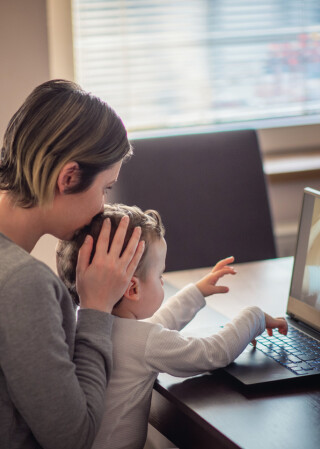The breakdown of a family unit is difficult and stressful at any given time, with many families experiencing this loss each day. For children, this loss is commonly associated with the separation of their parents and the new residency and parenting arrangements they will have to adjust to.
So what impact has the continued COVID-19 pandemic had on existing parenting arrangements? Generally, it is expected of parents to comply with Court Orders consistent with their responsibilities to act in the children’s best interests while also ensuring their safety and wellbeing. This includes facilitating their time with each parent as set out in Court Orders or parenting arrangements.
The Family Court of Australia recognises that compliance can be difficult in times when measures or restrictions are put in place to help slow the spread of COVID-19 and has issued a general guidance for families about parenting Orders and COVID-19 and a statement from the Chief Justice can be found on the website.
In general, parents are encouraged to communicate with each other directly or with the assistance of a family dispute practitioner or lawyer about complying with current orders and attempt to find practical solutions to the difficulties they are facing or reach an alternative agreement.
Parents are expected to act reasonably or to have a reasonable excuse for not complying with Court Orders.
Where a practical and sensible solution cannot be reached the Family Court of Australia together with the Federal Circuit Court of Australia have established an exclusive National COVID-19 Court list dedicated to family law disputes arising as a direct result of the COVID-19 pandemic.
The criteria to have a matter heard in this Court list includes:
- The application has been filed as a direct result of or has a significant connection to, the COVID-19 pandemic.
- Reasonable attempts have been made to resolve the dispute without success.
- The matter is urgent or of a priority nature.
If the matter is suitable for the COVID-19 List, a first return date can be given within three business days if the Court assesses the application as urgent, or otherwise within 7 business days if priority but not considered urgent.
Examples of matters which are suitable for the COVID-19 list can be found on the Family Court website some of which include:
Family Violence: where there is an increase or escalation of family violence associated with the pandemic such as a breach of an AVO, or where a party is charged with a family violence related offence.
Vaccinations: If there is a dispute about a child being vaccinated against COVID-19.
Medical: The parties cannot fulfil the parenting obligations due to a party and/or child testing positive for COVID-19 or medical complications from having contracted COVID-19, or due to concerns about infection or quarantine requirements.
Travel arrangements or border restrictions: the parties live in different States or Territories and there are difficulties or anticipated difficulties with the child travelling between the parties’ residences, including due to any Government restrictions, or a party is planning international travel.
Supervised contact: the current parenting arrangements involve supervised contact, and the contact centre is closed or the supervisor is unable to perform their role, and the parties cannot agree on an alternative arrangement.
COVID-19 related employment: a party is a front line health worker or engaged in other employment connected with COVID-19 that is impacting parenting arrangements or compliance with orders.
As the current pandemic continues to unfold and evolve it is important that when practical to do so parents should make alternative arrangements for children and when that is not appropriate to do or agreement cannot be reached you should seek legal advice to discuss your options and legal obligations.
The contents of this publication are for reference purposes only. This publication does not constitute legal advice and should not be relied upon as legal advice. Specific legal advice should always be sought separately before taking any action based on this publication.


